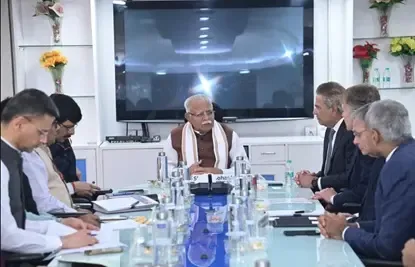What Progressive Reforms in Public Procurement Did the AiMeD Praise?

Synopsis
Key Takeaways
- Government reforms aim to create a fair procurement system.
- Judicial support strengthens the commitment to Atmanirbharta.
- Indian manufacturers are encouraged to innovate and compete.
- Exclusionary practices are being challenged legally.
- This is a pivotal moment for the healthcare sector in India.
New Delhi, June 3 (NationPress) The Association of Indian Medical Device Industry (AiMeD) commended the government's initiative on progressive reforms in public procurement on Tuesday. This robust judicial backing emphasizes the nation’s commitment to Atmanirbharta in healthcare, which emerged as a vital focus following the Covid pandemic.
With policies, regulations, and the judicial framework in sync, Indian manufacturers are optimistic about a fair competitive environment for tenders.
"We wholeheartedly endorse the initiatives taken by the government, policymakers, and the judiciary in fostering fairness in procurement," stated Rajiv Nath, Forum Coordinator of AiMeD.
"The message is unequivocal: favoring international entities over Indian ones is not only outdated but also lacks legal grounding," Nath remarked.
This statement comes in light of the European Union (EU) members' recent decision to limit imports of Chinese medical devices, impacting a pivotal sector under China's advanced manufacturing agenda.
Nath highlighted that the Indian government has consistently issued directives to prevent discrimination against local manufacturers.
The Department of Pharmaceuticals has advised against excluding indigenous manufacturers solely due to the absence of foreign regulatory certifications such as USFDA or CE.
“AiMeD views these initiatives as transformative steps towards a more inclusive and self-reliant procurement landscape,” Nath stated.
Furthermore, he referenced the Supreme Court's ruling in the 2025 Gwalior Municipal Corporation case, which criticized exclusionary practices that presumed Indian incapacity by multinationals. Although centered on municipal procurement, the ruling established a principle of fairness applicable across sectors.
"This judicial clarity has significantly boosted manufacturers' confidence in India, sending a strong signal to tendering authorities to reflect and enhance their practices," Nath articulated.
"With policy, legislation, and industry capabilities now harmonized, we believe this marks a critical juncture for domestic manufacturers.
"Especially for those pioneering advancements in diagnostics, surgical, and therapeutic devices, this represents a prime opportunity to amplify their impact," he concluded.









